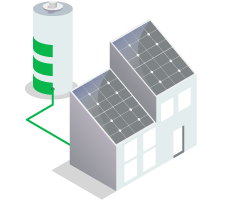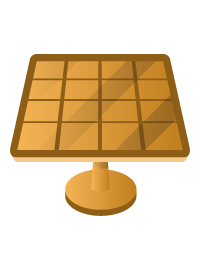Battery Storage for Homes: A Complete Solar Power Guide
In today’s evolving energy landscape, understanding home battery storage is more important than ever. As energy prices rise and renewable energy becomes increasingly popular, many homeowners are asking, "how much battery storage do I need for my house?" This guide covers everything from the basics of battery energy storage systems to cost considerations and regional insights in Australia.
What Is Battery Storage?
Battery storage refers to systems that store electrical energy for later use. Often integrated with renewable energy sources like solar panels, these systems allow homeowners to capture excess energy during peak production times. In technical terms, a battery energy storage system (BESS) is designed to store power for use during periods when energy production is low, thereby enhancing energy efficiency and reliability.
Understanding what a battery energy storage system can help you see how these solutions are transforming the way we power our homes. Whether you’re exploring home battery storage options or considering solar panel battery storage, the key is knowing how these systems work together to reduce reliance on the grid and so you can save money on your electricity bills.
Energy Bills are Rising All Across Australia! - Are You Prepared?
Get a Fixed Rate Plan Now and Save!
How Does Battery Storage Work?
To understand how battery storage works, imagine your battery as a large rechargeable container. When your solar panels generate excess energy during the day, the battery stores this energy. Later, when sunlight is insufficient or demand is high, the stored energy is released to power your home. This process is central to maximizing the efficiency of renewable energy systems and can help you save money.
Key Components of a Battery Storage System
A typical battery storage box or system comprises several key components:
- Battery Cells: Often made from lithium, these cells store electrical energy.
- Inverter: Converts stored DC power to AC power that can be used by household appliances.
- Charge Controller: Manages the flow of electricity to prevent overcharging and damage.
By understanding what is battery storage in a technical and practical sense, you can better evaluate the solutions available on the market.

How Much Battery Storage Do I Need?
One of the most common questions is, "how much battery storage do I need?" The answer depends on several factors, including your household's energy consumption, the size of your solar panel array, and your energy usage patterns.
Calculating Battery Storage Needs
To determine how much battery storage do i need for my house, consider the following:
- Daily Energy Consumption: Analyze your monthly energy bills to determine your average daily usage.
- Peak Usage Periods: Identify the times when energy demand is highest, such as early mornings or evenings.
- Backup Requirements: Decide if you need battery storage for critical appliances during power outages.
A typical calculation might involve multiplying your average hourly consumption by the number of hours you wish to cover without grid power. This will give you a rough estimate of the required battery capacity in kilowatt-hours (kWh).

Anker Solix offers reliable solar panels, along with batteries and generators to keep your home powered on or off the grid. Their scalable battery systems and portable solar generators make it easy to capture and store solar energy for everyday use or backup needs.
Is Battery Storage Worth It?
You may be wondering, "is battery storage worth it?" Here are some of the top benefits of battery storage in Australia:
- Energy Independence: Reduce reliance on the grid by using stored solar energy.
- Cost Savings: Lower electricity bills by using stored energy during peak pricing hours.
- Environmental Impact: Contribute to a greener future by maximizing renewable energy use.
- Backup Power: Ensure essential appliances continue running during outages.
However, there are some challenges:
- Initial Investment: The upfront cost for solar battery storage systems can be high.
- Maintenance Costs: Batteries have a lifespan and may need replacement after several years.
- Efficiency Losses: Some energy is lost during the storage and conversion processes.
By evaluating these factors, you can decide whether battery storage is a smart investment for your home.

Want to Switch to a New Energy Provider?
Speak to an agent or see more plans for free !
How Much Is Solar Battery Storage?
When considering how much it would cost for solar battery storage or how much is solar battery storage, several factors come into play:
- Battery Capacity (kWh): Higher capacity systems generally cost more.
- Type of Battery: Lithium battery storage systems tend to have a higher upfront cost but offer better performance and longevity.
- Installation and Inverter Costs: Professional installation and quality inverters add to the overall expense.
Price Ranges in Australia
On average, a home battery storage system can range from several thousand dollars to over ten thousand dollars, depending on your needs and the system’s specifications. Usually the initial costs for installation and setting everything up is quite high, but long-term you can save a lot of money by using solar panels and having the storage batteries prepared will help with this as well! Additionally, some states offer solar panel rebates that will help you save money even further.

Anker Solix offers reliable solar panels, along with batteries and generators to keep your home powered on or off the grid. Their scalable battery systems and portable solar generators make it easy to capture and store solar energy for everyday use or backup needs.

Comparing System Costs
Here’s a simplified cost comparison table for the best Solar Batteries on the market (March 2026):
| System Name | Capacity (kWh) | Average Installed Cost (March 2026) | Cost per kWh | Warranty |
|---|---|---|---|---|
| Alpha ESS | 10.1 kWh | $10,357 | $1,025 | 10 yrs |
| BYD | 13.8 kWh | $13,829 | $1,002 | 10 yrs |
| Enphase Energy | 10.0 kWh | $14,970 | $1,497 | 15 yrs |
| Goodwe | 10.3 kWh | $13,000 | $1,262 | 10 yrs |
| Sigenergy | 16.0 kWh | $15,987 | $999 | 10 yrs |
| SENEC | 9.0 kWh | $13,420 | $1,491 | 10 yrs |
| Sofar | 10.2 kWh | $11,181 | $1,092 | 10 yrs |
| Sonnen | 10.0 kWh | $13,888 | $1,389 | 10 yrs |
| Sungrow | 9.6 kWh | $10,643 | $1,109 | 10 yrs |
| Tesla | 13.5 kWh | $15,232 | $1,129 | 10 yrs |
Information sourced from solarchoice .net valid March 2026.
This table helps answer how much is a home battery storage system and provides a snapshot of the investment required.
Types of Home Battery Storage Systems
Lithium Battery Storage
Lithium battery storage is the most popular option due to its high energy density, longer lifespan, and efficiency. These batteries are ideal for solar battery storage, offering a robust solution for most households.
Battery Storage Boxes and Power Stations
A battery storage box is a compact solution that integrates easily with existing solar panel setups. For larger installations, a battery storage power station might be necessary to meet higher energy demands.
Other Technologies and Innovations
Innovations such as the collie battery energy storage system and Makita battery storage are emerging in the market. These systems offer alternatives that may be better suited for specific applications or budget ranges.
What Is the Best Battery for Solar Power Storage?
When searching for what is the best battery for solar power storage, consider factors such as:
- Efficiency: Look for systems with high round-trip efficiency.
- Lifespan: Longer warranty and operational life can reduce long-term costs.
- Cost: Evaluate the cost per kWh to compare different options.
- Brand Reputation: Check customer reviews and expert ratings.
Lithium-ion batteries often top the list for residential use, providing a good balance of performance and durability. However, emerging technologies and competitive pricing may influence your choice in the near future.
How long does solar battery storage last?
Typically, quality lithium battery storage systems can last between 8 to 15 years, depending on usage patterns and maintenance.
Integration with Solar Panels
Integrating solar panels with battery storage maximizes the benefits of renewable energy. During the day, your solar panels generate electricity, and any surplus is stored in your battery. At night or during cloudy periods, the stored energy is used to power your home.

A combined system offers:
- Increased Energy Self-Sufficiency: Rely less on the grid.
- Optimized Energy Use: Store excess energy rather than wasting it.
- Cost Savings: Use stored energy during peak demand times for additional savings.
To simplify and enhance your solar setup, consider using AC solar modules. These panels come with built-in microinverters that convert solar energy from direct current (DC) to alternating current (AC) right at the source. This integrated design streamlines installation, minimizes the need for additional components, and enhances compatibility with battery storage systems.
This synergy between solar panels and battery storage is key to reducing your energy bills and ensuring reliable power.


Go green with Ovo Energy
Discover Ovo Energy's 100% carbon neutral energy plan.
Help your wallet and the environment by switching today!
Regional Insights: Home Battery Storage in Australia
Australian homeowners are increasingly adopting home battery storage systems to reduce energy costs and enhance energy independence. Prices and available incentives vary across the country, making it essential to understand what each state offers.
Battery Information per State
Western Australia
In Western Australia, cities like Perth benefit from abundant sunlight, making solar battery storage a highly effective solution. With tailored options available, homeowners in Perth and surrounding areas can maximize their solar energy potential and reduce grid reliance.
Queensland
Queensland residents in Brisbane enjoy similar solar advantages. Many Brisbane-based systems are built to handle fluctuating weather patterns, ensuring year-round energy optimization. The Sunshine Coast and Gold Coast also see rising adoption rates for solar battery storage, especially with state incentives.
New South Wales
In New South Wales, homeowners in Sydney are turning to home battery storage to mitigate high electricity costs. With more providers offering competitive solutions, Sydney residents and those in Newcastle and Wollongong can find flexible options to suit their energy needs.
Victoria
Victoria’s varied climate, especially in Melbourne, highlights the growing demand for energy security. Homeowners are increasingly investing in battery storage to reduce peak energy costs and grid dependency. Other major cities, like Geelong and Bendigo, are also seeing strong growth in adoption.
South Australia
In South Australia, Adelaide residents lead the nation in solar and battery storage adoption, driven by favorable incentives and high electricity prices. Regional cities such as Mount Gambier are also embracing battery solutions to improve energy reliability.
Tasmania
Tasmania benefits from a growing renewable energy market. In Hobart, more homeowners are combining solar panels with battery storage to better harness the state’s unique weather conditions.
Australian Capital Territory
In the Australian Capital Territory, Canberra homeowners are increasingly adopting battery storage solutions alongside solar panels. The city’s focus on sustainability and energy efficiency makes home battery storage a smart investment.
By exploring regional options and incentives across Australia, homeowners can better understand pricing and find the best deals for their specific areas.
Future Trends and Innovations in Battery Storage
The battery storage market is rapidly evolving. Innovations in battery energy storage systems are making home battery storage more efficient and affordable. As technologies like collie battery energy storage system and Makita battery storage gain traction, homeowners can expect improved performance and longer lifespans from their systems.
The integration of battery storage with renewable energy sources is set to transform the energy landscape. With continuous improvements in efficiency and cost reductions, battery storage will only become more favorable over time.
Making the Most of Home Battery Storage
Investing in a home battery storage system is a smart way to take control of your energy future. By understanding what battery storage is and how battery storage works, you can make informed decisions tailored to your energy needs. Whether you’re trying to figure out how much battery storage you need for your home or exploring how much is solar battery storage, the key is to balance cost, efficiency, and long-term benefits.
As technology continues to evolve, keeping an eye on emerging innovations will help you stay ahead in the energy game. With the right setup, you can harness the power of renewable energy, reduce your carbon footprint, and ensure that your home remains powered even during grid outages. Embrace the future of energy by exploring battery storage solutions that best fit your lifestyle and energy needs. The investment today could mean a more sustainable and cost-effective energy future for years to come.
Frequently Asked Questions
What is battery storage for homes?
Battery storage systems store excess electrical energy generated from renewable sources like solar panels to be used later, helping reduce reliance on the grid and save on electricity bills.
How does a battery energy storage system work?
It stores excess solar energy when production is high and releases it to power your home during low production or peak demand times, increasing energy efficiency and cost savings.
How much battery storage do I need for my house?
It depends on your daily energy use, peak demand times, and whether backup power is needed. Calculate by multiplying average hourly consumption by desired backup hours to estimate needed kWh.
Is home battery storage worth it?
Benefits include energy independence, cost savings, environmental impact, and backup power. Drawbacks include upfront costs, maintenance, and energy conversion losses.
What is the cost range for solar battery storage in Australia?
Systems typically cost between several thousand to over ten thousand dollars depending on capacity, type, installation, and inverter costs.
What are common types of home battery storage systems?
Lithium-ion batteries are popular for energy density and lifespan. Other types include battery storage boxes and power stations, modular systems, and emerging technologies suited for different applications.


